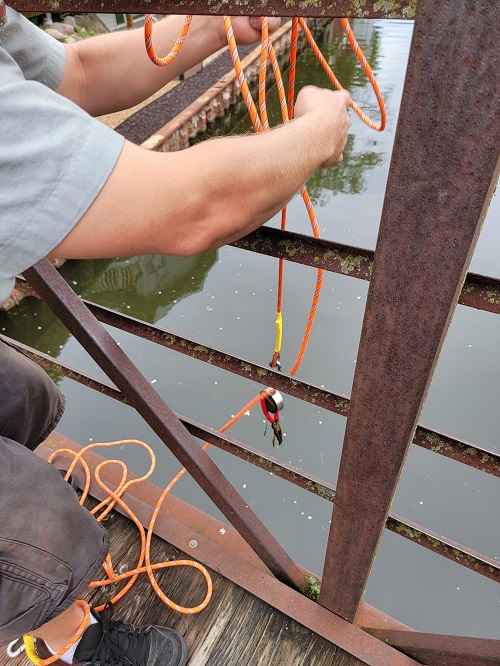
Bicycles are a common catch in magnet fishing, as are dockless scooters, random pieces of metal and more.
Unless you’ve been hiding in a fallout shelter for the last few years, it has been impossible to miss the phenomenon of magnet fishing, that combination of environmentalism and treasure hunting that involves people throwing powerful rope-attached magnets into deep water and pulling up – well, all kinds of metal things out of local waterways. Street signs. Bicycles. Dockless scooters. Boat anchors. Fishing tackle. Knives. Guns. Bombs. Live grenades.
Wait… what?
Make no mistake; these are not your mother’s refrigerator magnets or the horseshoe-shaped ones you used in science class. The element used to make the magnets used in fishing is neodymium, a difficult-to-produce rare-earth metal that is mostly mined in China, and it creates a magnet with a powerful pull.
Scroll through Facebook Reels or TikTok long enough and you’re sure to see people pulling up everything from old bicycles to rusted guns to car parts to boat anchors. But here’s what you might not know: it can be a competitive sport as well. In fact, there is a World Magnet Fishing Championship as well as a Magnet Fishing World Cup.
Sounds like even the competitive market is feeling the pull.
Baltimore Magazine reports that magnet fishing “is said to have taken off in Europe in the late 1970s, when boaters were determined to pull fallen keys from the bottom of ponds.”
According to NPR, the sport actually took a dramatic upturn in the USA during COVID (as did many outdoor sports) and launched a cottage industry, including that of Joshua Dunlap, of northern California, who started Centurion Magnetics in January 2020.
"Little did we know that COVID was starting a few months after [we launched] and it actually kind of worked out perfectly," Dunlap told NPR reporters. "It became a really popular hobby with people looking for ways to get outside to do something that was different. And magnet fishing happened to be one of those things. It's all over the world, but very specifically, definitely here in the U.S."
Social media stardom was achieved by a number of magnet salvage enthusiasts, including brothers Jake and Adam Cowart, who told NPR they have pulled up relics dating back to the 1800s, as well as safes, coins and dozens of weapons. They have even managed to retrieve, completely unintentionally, guns that wound up providing crucial evidence in cold cases. (A separate news story discussed a magnet fishing incident in which another man pulled up three guns inside a bank deposit bag.)
And sometimes, things got just a bit more exciting than the Cowarts ever expected – like the time one of their magnets attached itself to a 37mm World War I-era warhead, complete with fuse.
"I had to call an EOD [Explosive Ordnance Disposal specialist] and bomb squad out to get them to take that thing and defuse it," Jake Cowart told NPR. "I was scared, to be honest with you, because it's a warhead, and it can explode with any kind of impact. And it was stuck on my magnet on the explosive side. So, I was really, really, really freaked out about it." (The professionals safely detached the magnet from the warhead and departed with their bounty; the Cowarts were only too happy to see it go.)
It has become all but mandatory to post interesting finds to social media, whether these include a steel-toed boot, an old license plate – or a hand grenade. (Magnets are not attracted to precious metals such as gold and silver; however, metal safes, jewelry bags and wallets have been recovered, and found to contain such treasure.)
 Sometimes, the questions that arise from the objects pulled up are as murky as the water that held them. The issue of ownership is the biggest and is the most often asked when it comes to salvaged firearms. While guns generally have serial numbers, any metal object that has spent too much time in the water will become corroded, and that information may no longer be visible.
Sometimes, the questions that arise from the objects pulled up are as murky as the water that held them. The issue of ownership is the biggest and is the most often asked when it comes to salvaged firearms. While guns generally have serial numbers, any metal object that has spent too much time in the water will become corroded, and that information may no longer be visible.
Outdoor Life examined some of the issues, noting, “magnet fishers generally operate under the common law principle of abandoned property, better known as “finders/keepers,” which allows a discovering party to claim abandoned property legally.”
Outdoor Life’s reporter wrote: “This question is a legal onion (so much so that the Department of Alcohol, Tobacco, and Firearms, Cornell Law School, and several other legal experts that I contacted had no comment or insight to provide for this story.) At the very core of all the layers lies the issue of claiming abandoned property.
While the concept of finders/keepers generally holds up to some legal scrutiny, many states have abandoned property laws of their own. These rules might determine how long something must be left behind by a previous owner to be considered abandoned or they might require that property of a certain value be turned in. Since the very essence of magnet fishing is claiming abandoned property (and posting videos of that property to the Internet), knowing these laws is important.”
Some states (but not many) have laws governing magnet salvage. Those interested are encouraged to check the laws of the state where they will be fishing, rather than combing the Internet, where information can be outdated or just plain wrong. The Department of Natural Resources of each state can be a wealth of accurate information.
Currently, South Carolina is the only state with a specific law against the practice. Outdoor Life states, “The Underwater Antiquities Act makes it illegal to harvest any archaeological artifacts from state waters without a license, which the State only hands out if they feel the excavation is in their best interest. (Magnet fishing private waters is still unregulated.)”
In other states, a permit or license may be needed; the Indy Star notes, “Acknowledging the growing interest in the hobby, the Indiana Department of Natural Resources this year has started requiring people who magnet fish on department-owned land to get a free permit, said Max Winchell, a department spokesman.”
And of course, when it comes to guns being pulled from the water, it’s an even bigger issue, notes Outdoor Life:
“There are a lot of ways that keeping a gun found while magnet fishing could lead to legal trouble. That’s why most of the magnet fishing videos on YouTube that involve found firearms end with a call to local police. But even calling in weapons can lead to trouble. In fact, a call to authorities ended in a citation for Bryce Nachtwey and his friends for trespassing on military property after hauling in piles of explosives from Georgia’s Canoochee River on June 24, 2022. But those citations were eventually dropped.”
No matter what is being pulled out of a body of water, the magnet fishing crowd has its own rules of etiquette:
- No fishing on private property without permission
- Know the laws governing each body of water
- Report any suspicious or dangerous findings to the authorities
- Properly dispose of all salvaged goods afterwards. (While it can be onerous to drag heavy pieces of rusty scrap metal away from a body of water and take them to a dump, such habits are essential to ensuring that authorities continue to allow magnet fishermen to pursue their hobby.)
It has been well-documented that magnet fishing removes metal debris from waterways but that doesn’t mean everyone agrees that the hobby is harmless. Ecologists have their own concerns. Many are glossed over by magnet enthusiasts, but they do bear consideration.
The magnet may land on an object too heavy to retrieve, but the person operating the line will pull and tug on it, allowing neodymium to escape into the water and leading to health issues with surrounding marine life. Additionally, neodymium can penetrate the soil and also wind up in drinking water, particularly in reservoirs. Magnetic fishing can also disrupt the floor of the waterway, disturbing the ecosystem and bringing up heavy metals and chemicals that have been buried in the sediment. (A little-known fact: magnets this powerful also have the potential to interfere with pacemakers.)
Magnet fishing is not necessarily lucrative, per se (it’s not in the same category as professional bass fishing) but some jurisdictions have encouraged it, creating “trash for cash” events that raise money for donations to local charities. (Additionally, they are touted as fun activities for holidays like Memorial Day, Earth Day and Father’s Day.) And make no mistake, there are some individuals who have parlayed their magnet fishing into social media stardom and gained sponsors for their work.
While to date, there is no official association (much less a governing body) for the sport, it is likely only a matter of time. Meanwhile, there are discussion forums, Facebook groups, local clubs, meet-ups, competitions and of course, YouTube.
And the common denominator, no matter what the location or level of expertise, is this piece of advice: Get a tetanus shot first.

